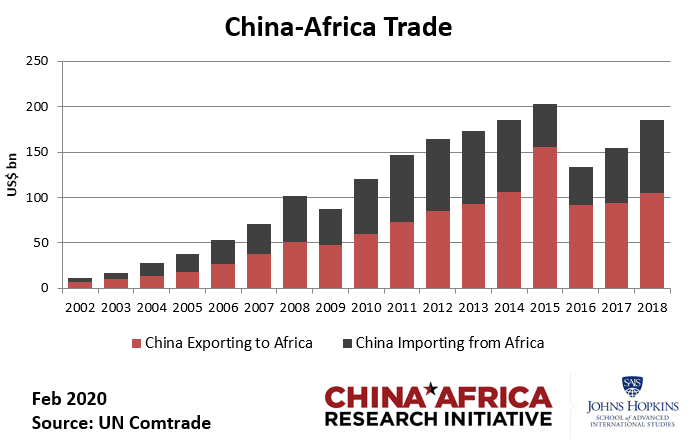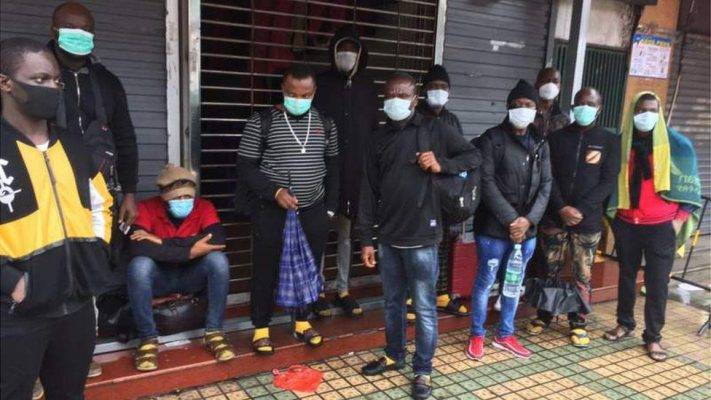Coronavirus Is Stifling China’s Business Romance With Africa

Ever since the novel coronavirus made its way from Wuhan, analysts did not take much time to foretell that the outbreak would affect many parallels. China-Africa trade, alongside Beijing’s influence in the continent, is ramming into a brick wall.
Three strong factors are at play. First, the anger over the ill-treatment of Africans in China. Second, Beijing’s current frustrations on its position to grant African countries debt relief in lieu of the pandemic outbreak. To cap it, China-Africa trade has plummeted in Q1 2020.
China-Africa Trade
Fresh data from China’s General Administration of Customs shows that trade between the Asian nation and Africa went down in the first quarter of the year. Coronavirus did its bit in shaking the second-largest economy in the world, as much of China was on lockdown for the most part of the quarter.
Steadily, for the past 16 years, the trade dealings between China and Africa has been growing. But due to the pandemic, it dropped by 14 percent year on year, resulting in USD 41.23 Bn. From January to February this year, Chinese factories and ports were closed, which ate its way into exports and imports.

While China’s struggle with the impact of the tariff war with the United States refuses to end, raw material imports from Africa fell by 17.5 percent in the quarter to USD 19.8 Bn. Meanwhile, exports dropped by 10.5 percent to USD 21.4 Bn.
China is Africa’s biggest trading partner and the world’s largest oil importer. It imports oil from African countries such as Congo-Brazzaville and Nigeria. But, things have drastically turned: economic slowdowns resulted in a crude oil price decrease, which threatens to get worse.
While trade has been stifled by a shortage of flights between these two places, Beijing’s multi-billion projects in Africa have grounded to a halt. Engineering personnel are unable to travel to the continent in the same way it’s difficult to get construction materials through dried-up supply chains.
Debt Relief
For years, Beijing has been pouring in billions of dollars in its quest to establish meaningful friendship and influence politics in Africa. But the pain to the country’s promising move is the rampant COVID-19, whose cases in the continent are now over 25,000.
Debt relief has become one of the household words in the economic aspect of these trying times. As Sub-Saharan Africa risks wholly going into recession while fighting the outbreak, IMF and the World Bank sees it fit for lenders to cease debt repayments—at least for now.
Asides the China-Africa trade conundrum, Beijing’s years of careful work in the region stands the risk of being upended by the current debt relief saga. China appears reluctant to endorse a G-20 decision to suspend Africa’s debt payments until the end of the year.
The situation has given birth to a sense of frustration, which analysts say will lead to a lasting damage if not addressed pronto. Indeed, Beijing is widely regarded as the single largest creditor to Africa. As of 2018, some 20 percent of African governments had huge debts with China.
Nevertheless, China’s special role is only been questioned by its reserved responses. As a member of the IMF and the World Bank, China is supposed to participate in that collective debt relief effort. However, China seems unlikely to take a “unilateral approach” to debt forgiveness.
Disgruntling Evictions

The moment Chinese doctors stepped foot in Nigeria, the uproar among many became another suggestion to the continuing China-Africa tussle. But that’s not the only reason these two partners are at odds. The mistreatment of African citizens in China in the wake of coronavirus also plays strongly.
China’s longstanding multi-billion-dollar campaign has helped it make friends, allies too, with multilateral institutions such as the United Nations and the WHO. This, in-between, undermines what was once a reliable lock on the postwar order by the West, partially helping China to grow its economy.
The African Union (AU) is no exception of these relationships. Regardless, Africans from Togo, Nigeria and Benin residing in Guangzhou in southern China, were evicted from their homes and made to undergo obligatory testing for coronavirus.
The incident reportedly involved men being pulled out of their families and forcefully quarantined in hotels. The entire situation stirred discontent among Africans at home and in diaspora, culminating in a rare diplomatic shutdown between Chinese and African officials.
For long, Africa has had a tradition of complaining about its problems with China behind closed doors. Things, however, broke to a change, forcing China to explain—in what has been widely regarded as a failed attempt.
Balance To Redress?
It is hard to see how things would go back to normal between China and Africa. On its part, Donald Trump’s administration has repeatedly tried to dissuade the continent from dealing with China, citing diplomatic dangers.
However, no one expects China to loose its position as Africa’s biggest bilateral lender and trade partner.
Based on current talks between officials from both sides, the problems may soon be resolved. But then, coronavirus and the battle against it may slow things down.
China has invested tremendously in Africa, so it is fairly easy to see that these issues would not be long-term.